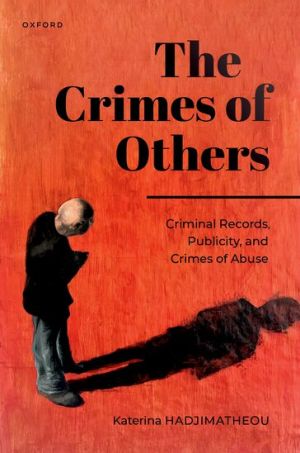
Do we have a right to know about each other's criminal past? And if so, just how publicly accessible should criminal records be? Does publicity serve an important purpose in fulfilling the public's right to know about who amongst their fellow citizens is dangerous or has violated collective moral norms? Does it provide transparency in criminal justice, the just punishment of the guilty, and the protection of the vulnerable from serial perpetrators? Or does it stigmatize people as dangerous or untrustworthy for life, so that those who have made mistakes in the past are still paying for them long after they have served their time? How should we design our laws and policies to reconcile or balance these apparently competing demands of (criminal) justice?
The Crimes of Others: Criminal Records, Publicity, and Abuse draws on philosophical and legal theory as well as new empirical evidence about the impacts of criminal records to address these questions. Katerina Hadjimatheou argues that there is no general right of citizens to know about each other's criminal records; instead, there are limited rights to know, which differ according to the status or role of the person claiming such a right, the nature of the crime in question, and the purpose for which the right is asserted. Notably, the book asserts that disclosures of criminal records to prevent harm are often justified when the risk relates to predatory crimes and crimes of abuse. The reasons relate to the distinctive features of such crimes, in particular their serial nature, the widespread impunity with which they are committed, and the special role of secrecy, lies, and silencing in their perpetration.
The Crimes of Others offers the first rigorous and systematic analysis of the normative aspects of public access to criminal records, providing a coherent set of criteria for the disclosure of criminal records that can be drawn upon to answer the question: when, to whom, and on what grounds should different kinds of information about the criminality of others be available? In doing so, it lays the groundwork for fairer and more effective policies and practices for a digital age.
This is an open access title available under the terms of a CC BY-NC-ND 4.0 International licence. It is free to read on Oxford Scholarship Online and offered as a free PDF download from OUP and selected open access locations.